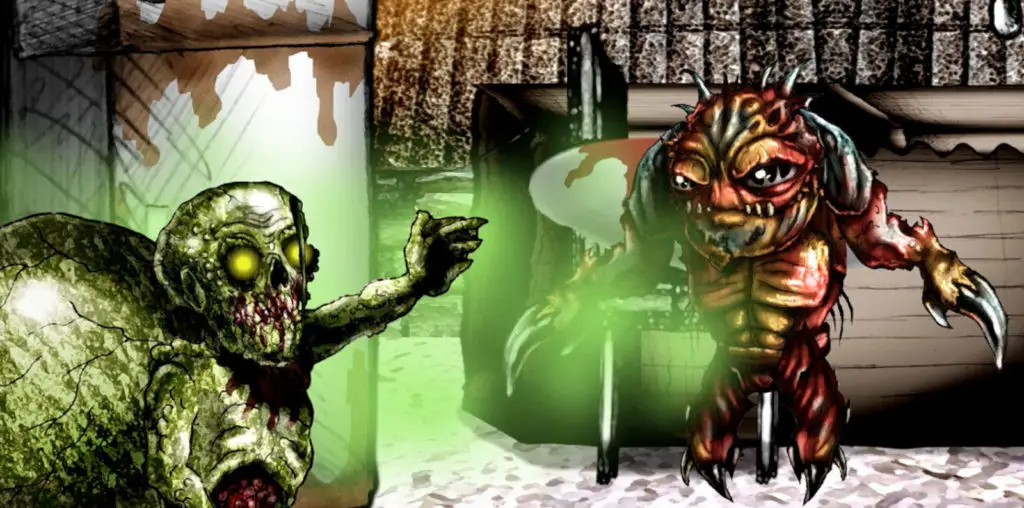
Cousins Derek (Dan Poole) and Jay (Derek Minter) spend their days installing equipment on antenna towers, high above the ground. When a recent job for Bob Chase (Brian Razzino) of Randall Communications, Inc. results in one of their crew almost dying during a job, the two cousins find themselves at odds with the corporation. Derek wants to know exactly what type of experimental equipment they’re dealing with and Jay just wants to get closer to RCI employee Tina (Ariana Almajan), who also happens to be his ex-girlfriend.
Unfortunately, one of Jay’s predominant character flaws is an impulsiveness coupled with a penchant for violent, angry outbursts, and his visit to RCI one night to surprise Tina winds up giving him a first-hand look at exactly what type of experiments RCI is involved with. Soon, with Tina and Bob playing him all the way, Jay is just another experimental test subject, drinking a strange liquid and getting shot with electrical charges (or microwaves… radio waves… something). This has the unfortunate side effect of making Jay even more unpredictable and, one morning when he’s supposed to be assisting Derek up a tower, Jay instead causes an accident with one of the experimental antenna, frying his cousin Derek in the process.
Derek wakes up in a hospital bed, only things are different. He’s hungry all the time, dehydrated… and able to move at super speeds, shoot electrical bursts from his body and see radio waves. While Jay is developing similar abilities (he seems capable of manipulating microwaves) under test conditions, Derek’s sudden super-abilities are instead the subject of his own personal trial-and-error… which often lands him back in a hospital bed. The two develop their powers in their own ways and it’s not long before the two cousins find themselves pitted against each other, with Jay’s irrational behavior getting the better of his persona while Derek assumes a more familiar hero role.
The Photon Effect wonderfully captures the spirit of comic books, at least the ones I used to read when I was a kid (not the gritty, angry titles nowadays). It’s not a surprise that writer/director Dan Poole, responsible for the fan-favorite cult film The Green Goblin’s Last Stand, has come up with a comic book-style film that is heavy on the action and the witty commentary (Spider-Man was not known for his stoney silence). And in that way, it evokes those old Spidey tales, focusing on the fast-paced and the fantastical.
The film also does a great job of playing up superhero tropes that we’re all so familiar with; it’s no accident that Derek’s climbing gear, powers and eventual outfit are blue, while Jay’s gear and power winds up being red and/or warmer colored. It’s a classic move, delineating good and bad with colors, and that’s why it works. It fits the nostalgic tone perfectly.
And the origin does too. Classic heroes and villains always seemed to come from some experiment gone awry or unfortunate explosions. There was a personal connection to be found between many of those in conflict, and evil corporations bent on either mass profit or world destruction were always around the corner, or behind everything. It all feels comfortable and on-point. If years of loving and reading comics prepared me to embrace this film, those same years taught Poole exactly how to craft something I’d enjoy.
That said, there are a few missteps here and there. While most of the effects are spot-on and in time with the film, some seem a bit like “green screen gone crazy.” For example, shooting electro-bursts or creating mini black holes? Look amazing. Having a full-body shot of Derek run alongside a speeding motorcyle? Not so good. I’d say that the effects that rely most on enhancing simple character gestures or actions work the best, while anything large-scale, not surprisingly, suffers the most. We’re not talking awful, by the way, most of the effects are far better than what I’m used to seeing in independent projects, but there is a marked difference when in comparison.
It’s also odd to say, when watching a superhero film, that you have trouble believing in something you’re seeing onscreen, but I’m going to do it: I had a hard time believing that Jay was capable of that random a series of mood swings. One second he’s a sympathetic cousin, the next he’s a raging and/or irrational psycho. While you can easily explain it away within the context of a superhero world (“hey, man, he can make people s**t their pants with microwaves and that doesn’t bother you, so maybe he also has mood issues that are beyond your comprehension”), it still didn’t sit well with me. Maybe if the swings weren’t as severe? That said, having a supervillain that doesn’t go Joker-style evil, more like a black hole-making, still-capable-of-some-intelligent-thought Hulk, is refreshing.
In the end, though, The Photon Effect aims at making a nostalgic, though original, superhero film and it succeeds. It’s nice to see filmmaker Poole create super heroes and villains that are entirely his own, and they all work within the world he has crafted. The end of the film leaves us with the possibility of more films about Poole’s creations, and I’d like to see what else he’s got up his sleeve, especially if someone will invest some truly, major blockbuster-friendly money into his ideas.
This film was submitted for review through our Submission for Review system. If you have a film you’d like us to see, and we aren’t already looking into it on our own, you too can utilize this service.
